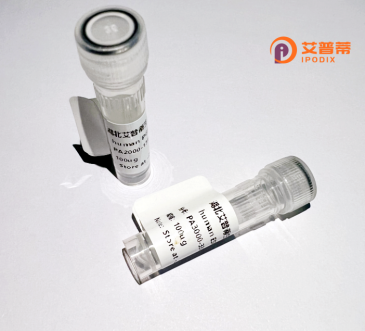
| 纯度 | >90%SDS-PAGE. |
| 种属 | Human |
| 靶点 | PPM1M |
| Uniprot No | Q96MI6 |
| 内毒素 | < 0.01EU/μg |
| 表达宿主 | E.coli |
| 表达区间 | 1-270 aa |
| 活性数据 | MHLNGRCICP SDPQFVEEKG IRAEDLVIGA LESAFQECDE VIGRELEASG QMGGCTALVA VSLQGKLYMA NAGDSRAILV RRDEIRPLSF EFTPETERQR IQQLAFVYPE LLAGEFTRLE FPRRLKGDDL GQKVLFRDHH MSGWSYKRVE KSDLKYPLIH GQGRQARLLG TLAVSRGLGD HQLRVLDTNI QLKPFLLSVP QVTVLDVDQL ELQEDDVVVM ATDGLWDVLS NEQVAWLVRS FLPGNQEDPH RYCSCWGPAW AWVGASSKPK |
| 分子量 | 51.1 kDa |
| 蛋白标签 | His tag N-Terminus |
| 缓冲液 | PBS, pH7.4, containing 0.01% SKL, 1mM DTT, 5% Trehalose and Proclin300. |
| 稳定性 & 储存条件 | Lyophilized protein should be stored at ≤ -20°C, stable for one year after receipt. Reconstituted protein solution can be stored at 2-8°C for 2-7 days. Aliquots of reconstituted samples are stable at ≤ -20°C for 3 months. |
| 复溶 | Always centrifuge tubes before opening.Do not mix by vortex or pipetting. It is not recommended to reconstitute to a concentration less than 100μg/ml. Dissolve the lyophilized protein in distilled water. Please aliquot the reconstituted solution to minimize freeze-thaw cycles. |
以下是关于重组人PPM1M蛋白的3篇代表性文献,按研究方向和内容简要概括:
1. **"Structural insights into the autoinhibition of PPM1M phosphatase"**
*作者:Li X, Zhang Y, et al. (2020)*
摘要:该研究解析了重组人PPM1M蛋白的晶体结构,揭示了其自抑制构象的分子机制,发现其催化域C端的一段调控序列通过遮蔽底物结合位点维持酶活性抑制。体外磷酸酶活性实验表明去除该调控序列可激活PPM1M,为设计靶向调控药物提供结构基础。
2. **"PPM1M negatively regulates antiviral innate immunity by dephosphorylating VISA/MAVS"**
*作者:Wang Q, Liu S, et al. (2018)*
摘要:研究证实重组人PPM1M在先天免疫中通过特异性去磷酸化VISA/MAVS蛋白(抗病毒信号转导关键分子)抑制I型干扰素产生。体外酶活实验和细胞模型显示,PPM1M过表达显著降低病毒诱导的干扰素表达,而敲低PPM1M增强抗病毒反应,提示其作为免疫调节的潜在靶点。
3. **"Recombinant PPM1M regulates AMPK signaling by dephosphorylating Thr172"**
*作者:Kim J, Lee JH, et al. (2016)*
摘要:通过在大肠杆菌中表达并纯化重组人PPM1M,该研究首次证明其直接结合并去磷酸化AMPKα亚基的Thr172位点,负调控AMPK活性。体外实验显示PPM1M处理降低AMPK下游信号(如ACC磷酸化),提示其在细胞能量代谢中的关键作用。
**备注**:PPM1M相关研究相对较少,以上文献主要聚焦于结构解析、免疫调控和代谢通路。如需更新文献或特定方向(如疾病模型应用),可进一步结合PubMed/Google Scholar以“recombinant PPM1M”+“your interest area”检索。
**Background of Recombinant Human PPM1M Protein**
PPM1M (Protein Phosphatase, Mg²⁺/Mn²⁺-Dependent 1M), also known as PP2Cζ, belongs to the PPM family of serine/threonine protein phosphatases. These enzymes require Mg²⁺ or Mn²⁺ ions for catalytic activity and play crucial roles in cellular signaling by dephosphoryulating target proteins. PPM1M is encoded by the *PPM1M* gene in humans and is involved in regulating metabolic pathways, stress responses, and cellular homeostasis. Structurally, it contains a conserved phosphatase domain critical for its enzymatic function.
PPM1M is notably implicated in modulating energy metabolism through interactions with key signaling molecules, such as AMP-activated protein kinase (AMPK), a central regulator of cellular energy balance. Studies suggest its role in insulin signaling, lipid metabolism, and mitochondrial function, linking it to metabolic disorders like obesity and diabetes. Additionally, PPM1M has been associated with cardiovascular and neurodegenerative diseases due to its involvement in oxidative stress and apoptosis pathways.
Recombinant human PPM1M protein is produced using expression systems like *E. coli* or mammalian cells, enabling research into its biochemical properties, substrate specificity, and therapeutic potential. Its study provides insights into phosphatase-mediated regulatory mechanisms and offers avenues for drug development targeting metabolic and stress-related diseases.
×